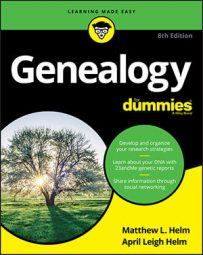If you decide to use email to contact other researchers, send them an email message introducing yourself and briefly explaining your purpose for contacting them. Be sure to include a listing of the ancestors you're researching in your message.
Before you rush out and start contacting people, however, we must offer the following sage advice:
- Before sending messages to a website maintainer, look around the site to see whether that person is the appropriate one to approach. Often the person who maintains a website is indeed the one who is researching the surnames you find on that website. However, it's not unusual for site maintainers to host information on their sites for other people. If they do, they typically have separate contact addresses for those individuals and an explanation that they're not personally researching those surnames. Some even go so far as to post notices on their sites stating that they don't entertain research questions. When you see a list of surnames on a site, don't automatically assume that the website maintainer is the person to contact. Look around a little to ensure that you're addressing the most appropriate person.
- Make your messages brief and to the point. Email messages that run five or six pages long can overwhelm some people. If the person you send the message to is interested in your information and responds positively to you, you can send one or more detailed messages at a future date.
- Ensure that your message is detailed enough for the recipients to decide whether your info relates to their research and whether they can help you. Include names, dates, and places as appropriate.
- Use net etiquette, or netiquette, when you create your messages. Remember, email can be an impersonal medium. Although you may mean one thing, someone who doesn't know you may mistakenly misinterpret your message. (For more on netiquette, see the nearby sidebar, "Netiquette: Using your manners online.")
- Don't disclose personal information that could violate a person's privacy. Information such as addresses, birth dates, and Social Security numbers for living persons is considered private and should not be freely shared with other researchers. Also, we don't recommend that you send much personal information about yourself until you know the recipient a lot better. When first introducing yourself, your name and email address should suffice, along with the information about the deceased ancestors you're researching.
- Get permission before forwarding messages from other researchers. Sometimes researchers may provide information that they don't want made available to the general public. Asking permission before forwarding a message to a third party eliminates any potential problems with violating the trust of your fellow researchers.

